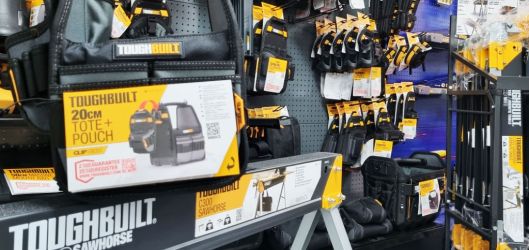
Tool supplier Protrade has ramped up its stockholding to help manage the significant supply chain disruption currently being experienced in the tools, fasteners and related markets, as well as more broadly.
Prior to the pandemic, Protrade help stock to the value of circa £1.8 million. This has since grown to £3.5 million, the supplier has revealed. Protrade added that instead of pre-Pandemic weekly orders of £10,000 top up stock levels, the firm is now having to place £500,000 to £600,000 orders to ensure coverage over a set period of time.
Despite the extra outlay, the firm said there are still some products and materials that it cannot get into its depots until Q1 or even Q2 of 2022.
In an article written by Protrade Managing Director Craig Sanders, the firm provided further detail on how it has changed the way it purchasing over the last 18 months:
"Traditional methods are no longer an option. Stocks at the manufacturers and wholesalers used to be plentiful. There were also no issues with the pipelines.
That was until COVID-19 hit early last year, of course.
What we’ve been left with is those pipelines clogged up and congested, while broad materials are scarce across multiple industries. Because of the pandemic, factories closed for long periods of time. A combination of that and Brexit has meant catching up has proven to be incredibly difficult during 2021 - to the point that it has been estimated that construction won’t see a complete recovery back to pre-crisis 2019 levels until 2023.
Sticking with that theme of purchasing, though, and I’m sure many businesses, and particularly buyers, in the construction and manufacturing industries will recognise how difficult it has been over the last eight months.
A good example of products that have been caught up in the supply chain disruption is PPE. That shortage led to another issue: price hikes, which are up 70% on what they were prior to the pandemic.
That equipment wasn’t alone. Numerous products have seen the same increase and forced many businesses with a decision to make on whether to purchase a product for an inflated price in big volumes, in the hope that it sells through before prices could fall again. That issue is still ongoing now and has made purchasing incredibly difficult.
Here at Protrade, we have been no different, but we have pivoted accordingly. We learned that we have to forecast far further ahead than we have had to before, especially with our larger suppliers. We’re placing orders for the next year or 18 months, scheduling the products so we know when we’re going to receive them.
Rather than placing weekly £10,000 orders to top-up stock levels, we’re now having to place £500,000 to £600,000 orders to ensure we’re covered over a set period of time. That does mitigate the issue but it certainly doesn’t solve it, because there are still some products and materials that we cannot get into our depots until Q1 or even Q2 of 2022.
As well as forecasting ahead, there are other steps that businesses can take right now to ease the heavy burden of pressure being caused by this supply chain disruption.
I referenced the importance of forecasting earlier in this article, but it is also necessary to recognise the financial implications of taking such an approach.
In short, business leaders in the construction and manufacturing sectors need to be able to confidently put their money where their mouth is if they are to avoid being left behind.
When the pandemic arrived, a lot of businesses were, naturally, cautious in their approach. There was a reluctance to speculate and place orders of big volumes because no one was really sure what was around the corner.
Purchasing levels initially dipped when COVID-19 arrived in the UK, but, according to the Chartered Institute of Procurement and Supply (CIPS) back in May, that has since picked up and gone beyond the level they were prior to the first lockdown.
By taking a leap of faith and securing significant volumes of stock, we have managed to maintain supplies across the majority of our product portfolio. We’re merchants within the construction and manufacturing industries, and if we haven’t got stock on the shelf, we have a big problem.
Being flexible with your stockholding is key
At Protrade, our stockholding, prior to the pandemic, was £1.8 million.
That has since grown to £3.5 million as we continue to manage the supply chain disruption we’re facing. Our approach is if we can get a product through the door, we will get it in and manage the holding accordingly.
Although we have almost doubled our investment in stock, which invariably impacts cash flow, it has stood us in great stead especially as prices continue to rise in the marketplace.
It’s not as simple as just stocking up though; many scarce products that have experienced significant price increases over the last few months could potentially settle in the near future, possibly leading to costs going in the other direction.
There are also products with shelf lives to consider, so it’s a fine balance between selecting the right type of stock and avoiding pitfalls. The biggest impact taking this approach has had on our business is that we have got plenty of stock for immediate delivery.
Certainly, within the construction industry, there’s a reliance on having the materials on-site when they’re required, so having it on the shelves and readily available is paramount.
Scanning the market is fine, but consider how short-term decisions could impact your business in the long-term
An obvious tip to alleviate supply chain issues is switching to alternative comparable brands or types.
In many situations, this can work but there will often be circumstances where rigorous safety or performance testing has taken place that determines a specific product has to be used.
If one ingredient in the product mix changes, the whole testing process becomes null and void. Brand loyalty can also come into play; changing a product that customers have used with no issues for years, can potentially lead to disappointment and even conflict.
In a manufacturing or production environment, there is a need for companies to communicate regularly and closely with their chosen supply partners.
It’s conceivable that solutions are readily available, once discussed. Companies have sometimes been reluctant to enter into contractual agreements, but price stability and continuation of supply far outweigh any potential risks or concerns.
How reviewing your packaging can improve your orders
A final tip for businesses importing containers into the UK would be to look at the packaging.
Protrade imports multiple containers of professional wood screws per year. By changing the box dimensions slightly, we have managed to fit another 18% worth of product inside a single container.
With a global shortage of shipping containers, this has not only eased pressure on the supply chain but has also helped mitigate the spiralling cost of shipping.
The world is changing and we need to be ready for it
Another issue actually has nothing to do with the pandemic or Brexit at all. It surrounds how the world is changing.
Battery cells are a good example of this, the ones traditionally used in cordless power tools within our industry.
The demand for these products is now coming from all angles with manufacturers prioritising accordingly. With the rise of electric vehicles across the world, battery cell producers are selling in huge volumes to car manufacturers and that, in turn, is driving the price up for other industries.
The supply chain is being exhausted by how the world is changing and where the demand is coming from.
Pause projects where necessary
Let’s talk about freight for a moment.
We have been liaising with a business recently about producing our own brand for a particular product. However, the freight cost to be able to get the items shipped to us has multiplied by six. This resulted in a 41% increase on the cost of the product.
We have made a decision to kick the idea into the long grass for now, until freight costs settle down again. In the meantime, we will continue to purchase an alternative existing brand that has products available, further down the supply chain.
Final thoughts
The supply chain issues this year have caused havoc, yes, but it isn’t to the point that it can’t be navigated or managed.
However, it does require business leaders to show a degree of bravery and make decisions and changes that have never had to be made before. Take the bull by the horns, so to speak. By throwing caution to the wind with purchasing, forecasting ahead, and increasing stockholding, we have been able to mitigate - not overcome - the series of issues that have reared their heads during 2021.
The situations we’re facing are not going to be here forever, but product and material is king, as is managing those supplier relationships that have been in place for a long time.
If a balance can be struck, both in terms of short and long-term capital thinking, businesses can still continue to thrive and release some of the heavy pressure that is weighing down on the shoulders of buyers up and down the country."
Are you in the fastener, tool, fixing or related industries? You can subscribe to Torque Magazine or sign up to our weekly newsletter.



